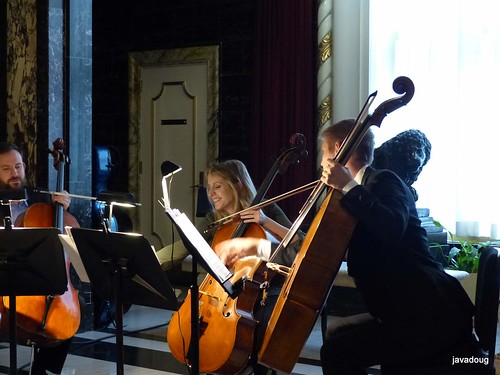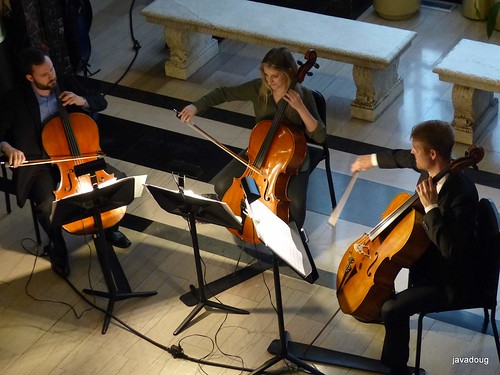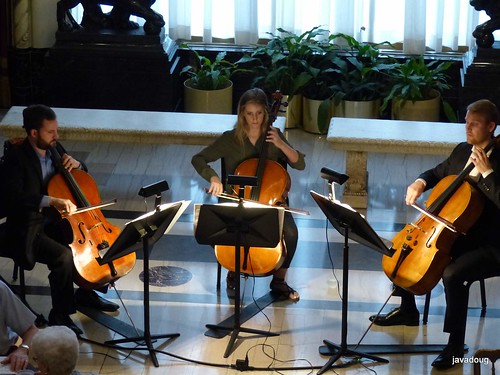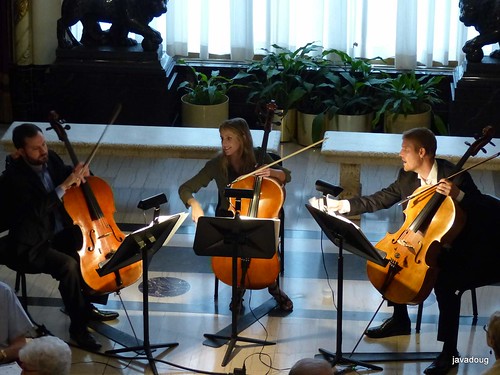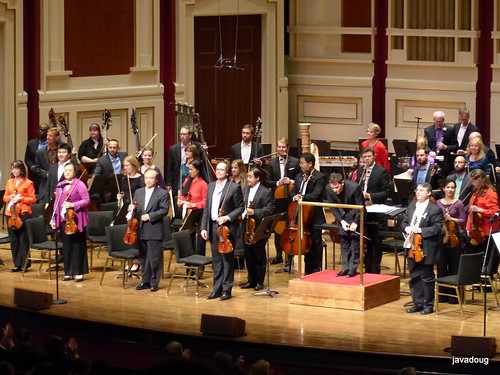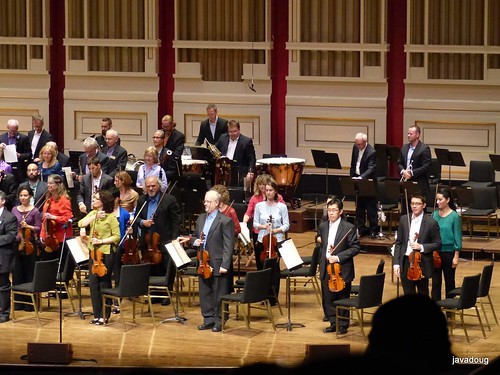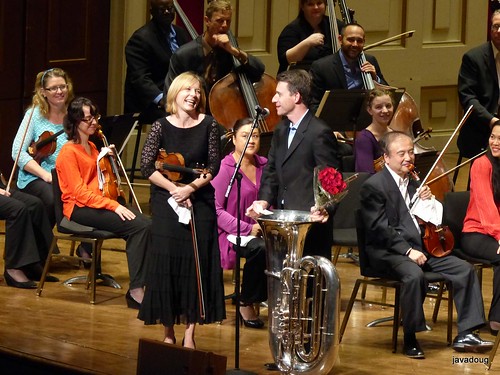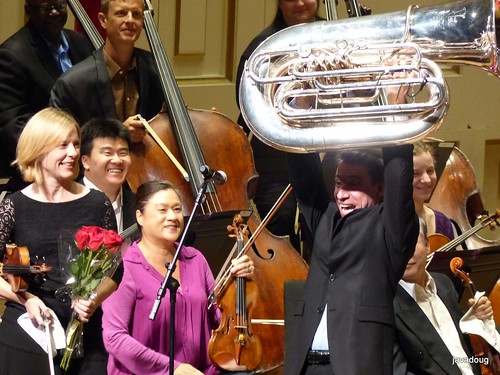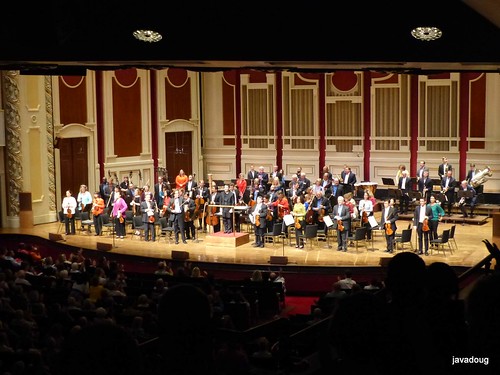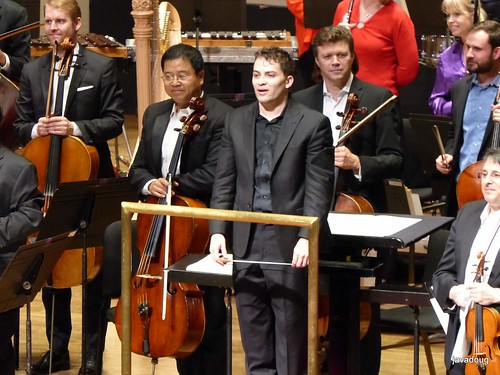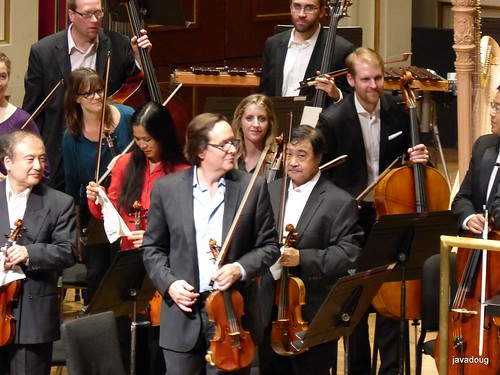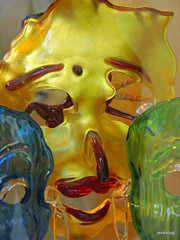As the lights strategically dimmed and before
music director Manfred Honeck appeared on the empty stage the audience arose in gleeful
anticipation and began a strident applause.
Conductor Honeck then walked out and addressed the audience: "We thank you for your loyalty,
your commitment to this institution and your unwavering support. We
will have a night that I am sure will be unforgettable. The music has
returned."
We
will have a night that I am sure will be unforgettable. The music has
returned."
 We
will have a night that I am sure will be unforgettable. The music has
returned."
We
will have a night that I am sure will be unforgettable. The music has
returned."
The musicians of the Pittsburgh
Symphony began to enter the stage, reversing the usual order of arrival
where conductor comes last. The applause became even more loud and
sustained. No need to sit down, the applause blended into The Star
Spangled Banner, the traditional start of the concert season and it
sounded like almost everyone sang the lyrics, even me. Click here to see it for yourself, but make sure the volume is down.
The
Overture to "Ruslan and Ludmila" by Mikhail Glinka was a fitting
beginning to classical music, a rousing orchestral jaunt joined
vociferously by every member of the orchestra. Instantly I realize how
much I missed the live music in a large hall, with the ability to single
out each instrument. And now here it is again, what a treat.


Next, soloist Cynthia Koledo DeAlmeida enters the stage to play "Gabriel's
Oboe" by Ennio Morricone. Before they start we hear an infant babbling in
the audience. The audience laughs when she says "I feel the same way."
Soft and smooth sounds roll from her oboe as she seamlessly guides the
rest of the orchestra. The selection is not long, but is beautiful.
Another audience member tells me the oboe is very difficult and her
performance is amazing.
Noah Bendix-Balgley returns to Pittsburgh for the violin solo of the Tchaikovsky Violin Concerto.
His style I find distinctive, and with the slower tempo we have a greater chance
to savour the sounds of the strings especially during the segments where he plays
alone. With the orchestra I hear the double bass to it's fullest. Soft pizzicati
augment the give and take between orchestra and soloist. The second slow movement brings subtlety
sweet sound almost surreal. The final movement interleaves various sections of the orchestra in
well positioned conversation back and forth using full development. Mr Bendix-Balgley has
certainly blossomed as a soloist.
At intermission I
reflect on the nature of life. To me much of life involves movement. To
get to the symphony this evening involves transportation. Leaving my
seat to walk to the lobby requires movement.
Music is irrevocably wrapped
in all kinds of movement. The composer creates music in his mind by
moving thoughts through synapses and neurons. Those thoughts become practices
on the piano, and then are scribed as notes on the manuscript to form
the musical score. That score is copied countless times and place before
the musicians, who, using their minds, bodies, muscles, lips, arms and fingers move
their instruments in beauteous professional harmony based on the reading
of the score. All this movement is led by the conductor, who with his
baton, synchronizes the unanimity of the amalgamation, and with gently
sweeping movements ushers forth the sounds from the musicians through their
instruments into the very air with brilliant vibrations of molecules
which reach out to our eardrums producing signals which move to our
brains. And we move our lips - we smile :) The circle is complete, but the movement never ends.
After moving back to my seat the second half begins. Several days
ago I heard Dvorak's Symphony 9 From the New World several times on the
radio. At the time I thought to myself (not knowing what was to be
played this evening): wouldn't it be great if they were playing this
wonderful symphony Friday. Well it turns out they were. Coincidence I'm
sure. I've heard this played by the PSO at Heinz Hall before. But
tonight it's alive and fresh, in fact, it could never grow old.
Everything about this music is Big! It was written when the composer visited America: A big country indeed. The music itself is big, bold, and loud, but not so that you want to reduce the volume, but rather appreciate it's very vivid character just as it is. The second movement: Largo, I like to think of as a lazy river. The English Horn just screams rustic charm like a steamboat moving down a lazy river. And then there are the sections where we hear all the voices of the string section play in unison, it's the original connotation of good vibrations that transcend my very soul.
The third movement brings genuine goose bumps and reminds me at times of a fugue like that of Bach, but there's plenty of drama as if two parts of the orchestra are having a melodic conversation. In between is a waltz intermezzo which pleases the sweet tooth, but the fugue and drama return. The forth movement proves there's something new around every turn. Here again we feel the aspects of bigness: This Is A Big Country. The movement screams to a stunning and loud conclusion and all the while Manfred Honeck is playing the orchestra like an instrument. It becomes most evident at the end.

Based on complement of instruments not used I knew there would be an orchestral encore. I was right, but this was a premier of "Fanfare for Pittsburgh" by James MacMillen which had been delayed because of the unfortunate strike which had thankfully been resolved. This piece was for full orchestra with lots of percussion. Like a chase scene in any movie with boats screaming down the rivers, and cogs of machinery constantly turning, the music and tones move up and down, and then twice we hear a gong near the end. A xylophone leads a transition to the ending, and then it's over. A fanfare which you probably won't hear again soon unless you come on Sunday for the second show or hear on WQED next week.
Everything about this music is Big! It was written when the composer visited America: A big country indeed. The music itself is big, bold, and loud, but not so that you want to reduce the volume, but rather appreciate it's very vivid character just as it is. The second movement: Largo, I like to think of as a lazy river. The English Horn just screams rustic charm like a steamboat moving down a lazy river. And then there are the sections where we hear all the voices of the string section play in unison, it's the original connotation of good vibrations that transcend my very soul.
The third movement brings genuine goose bumps and reminds me at times of a fugue like that of Bach, but there's plenty of drama as if two parts of the orchestra are having a melodic conversation. In between is a waltz intermezzo which pleases the sweet tooth, but the fugue and drama return. The forth movement proves there's something new around every turn. Here again we feel the aspects of bigness: This Is A Big Country. The movement screams to a stunning and loud conclusion and all the while Manfred Honeck is playing the orchestra like an instrument. It becomes most evident at the end.

Based on complement of instruments not used I knew there would be an orchestral encore. I was right, but this was a premier of "Fanfare for Pittsburgh" by James MacMillen which had been delayed because of the unfortunate strike which had thankfully been resolved. This piece was for full orchestra with lots of percussion. Like a chase scene in any movie with boats screaming down the rivers, and cogs of machinery constantly turning, the music and tones move up and down, and then twice we hear a gong near the end. A xylophone leads a transition to the ending, and then it's over. A fanfare which you probably won't hear again soon unless you come on Sunday for the second show or hear on WQED next week.


One blogger gets his 15 seconds of fame!


